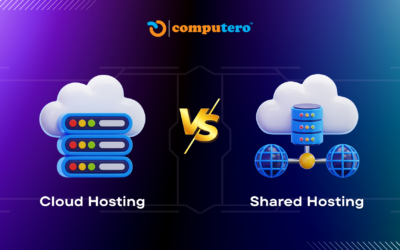Cloud hosting is the ability to make applications and websites available on the Internet using the cloud. Managed Cloud hosting tanks the computing resources from a network of virtual and physical servers, allowing for greater flexibility to quickly make changes.
Managed hosting works through the process of virtualization. As written above, with a virtual private server, a virtual layer is created on the server where content and other resources can be stored.
These virtual layers can then be replicated on other servers on the cloud computing network, spread throughout the different regions across the world.
Firms and institutions have benefited from advances in virtual computing for many years, and cloud-native architecture is becoming more popular in order to seamlessly integrate complicated tasks; organizations increasingly rely on managed cloud hosting and IT managed services for cybersecurity to run and maintain websites, applications, and server infrastructure.
What is Private Cloud Hosting?
Private cloud hosting is where a private server is remotely hosted by a third-party service provider, where computing resources are provided through the third-party data center but remain available to the client.
This is in contrast to the traditional private cloud, which is a cloud application that belongs solely to the user organization and is physically located on-site within an in-house data center.
How Does Private Cloud Work?
A private cloud dedicates specific cloud resources to a single organization, making sure that a high level of security and privacy is maintained through a prioritized architecture. Either an organization itself manages the architecture.
The organization’s intranet houses the private cloud infrastructure, where a private network maintains services and infrastructure. The setup provides an organization with greater control over data, improved security, and flexibility to customize the hardware and software to meet the specific needs of the business.
Advantages of Private Cloud Hosting
Private cloud hosting offers improved security because resources are exclusively dedicated to a single organization, minimizing the risk of external security breaches. It provides businesses with greater control over their infrastructure, allowing them to customize hardware, software, and networking to meet specific requirements.
Moreover, the private cloud allows companies to meet tough compliance and regulatory requirements, which easily makes them an ideal choice for industries such as healthcare that handle sensitive information.
Disadvantages of Private Cloud Hosting
Though private cloud hosting offers control and security, it comes with various drawbacks. The setup requires a significant investment in terms of cloud infrastructure and ongoing maintenance, which can be costly for some organizations.
Deploying and managing a private cloud demands technical expertise, making it a challenge to maintain without skilled personnel. Moreover, it provides scalability; the level isn’t as flexible as public cloud services making it a scaling resource but on a limited scale.

What is Dedicated Server?
Dedicated servers are purchased or leased exclusively for a user enterprise. It is a private web hosting service, as the server hosts the applications of a single-tenant organization that has full and unmediated access to the server hardware.
How Does a Dedicated Server Work?
A dedicated server is located offline, as it stores all computing resources on its infrastructure and hardware. Unlike virtual solutions, the capability of a dedicated server is reliant on the specification of this physical hardware.
The price varies largely depending on high demand from large enterprises for data security or for server volume, which can charge more than their low-capacity counterparts.
However, a dedicated server belongs to a single data center location; these are then categorized in a tier system which accounts for how many redundant systems are in place of power, backup power, and cooling- which are the foundations of a physical computing infrastructure.
Advantages of Dedicated Cloud Hosting
Dedicated hosting provides you with exclusive access to a whole system, meaning all of it is resources- like CPU and RAM are fully dedicated to a single user.
This leads to a significantly better performance, as there is no competition for resources with other websites. Businesses that require high availability, such as data-heavy applications, benefit from this level of resource availability.
Disadvantages of Dedicated Cloud Hosting
The major downfall of a dedicated server is that it requires a considerable amount of technical expertise. Businesses might need to hire a highly trained IT staff to handle server management and updates.
Disaster recovery is another huge downside of this hosting, as it often requires extra infrastructure investment to guarantee data backup and failover capabilities in a single place.
What is The Difference Between Private Cloud Hosting V/S Dedicated Hosting?
The key difference between a private cloud hosting and a dedicated hosting is described below:
| Private Cloud Hosting | Dedicated Hosting |
| Level of control: You have control over virtual elements, as the hardware is managed by a third party. | Level of control: You have complete control over the physical server and associated software. |
| Scalability: Scalability is much more flexible in this case. | Scalability: In this case, requires additional hardware. |
| Performance: High performance with scalability via resource pooling across several servers. | Performance: High performance, but it is limited to the physical resource of a single dedicated server. |
| Management: With private cloud hosting, your provider will manage the physical infrastructure. | Management: You’re solely responsible for managing and maintaining your dedicated hosting hardware and software. |
What is Managed Hosting Service?
A managed hosting service provider offers support for each single task. The operating system, control panel, and pre-installed applications are assisted, managed, and supported by the service provider.
The operating system is then installed along with various software inside the server, which helps smooth the functioning of the web hosting and running numerous applications on websites. In case you’re looking for a reliable managed hosting provider then you can always look towards Computero.
Key Takeaways
Private managed hosting and dedicated hosting services are then used by a wide range of organizations of varying sizes and requirements for front and back-end solutions.
To conclude simply, private cloud hosting offers greater flexibility, scalability, and provider-managed infrastructure, whereas dedicated managed hosting offers total freedom but is typically less flexible when compared to scaling resources.




